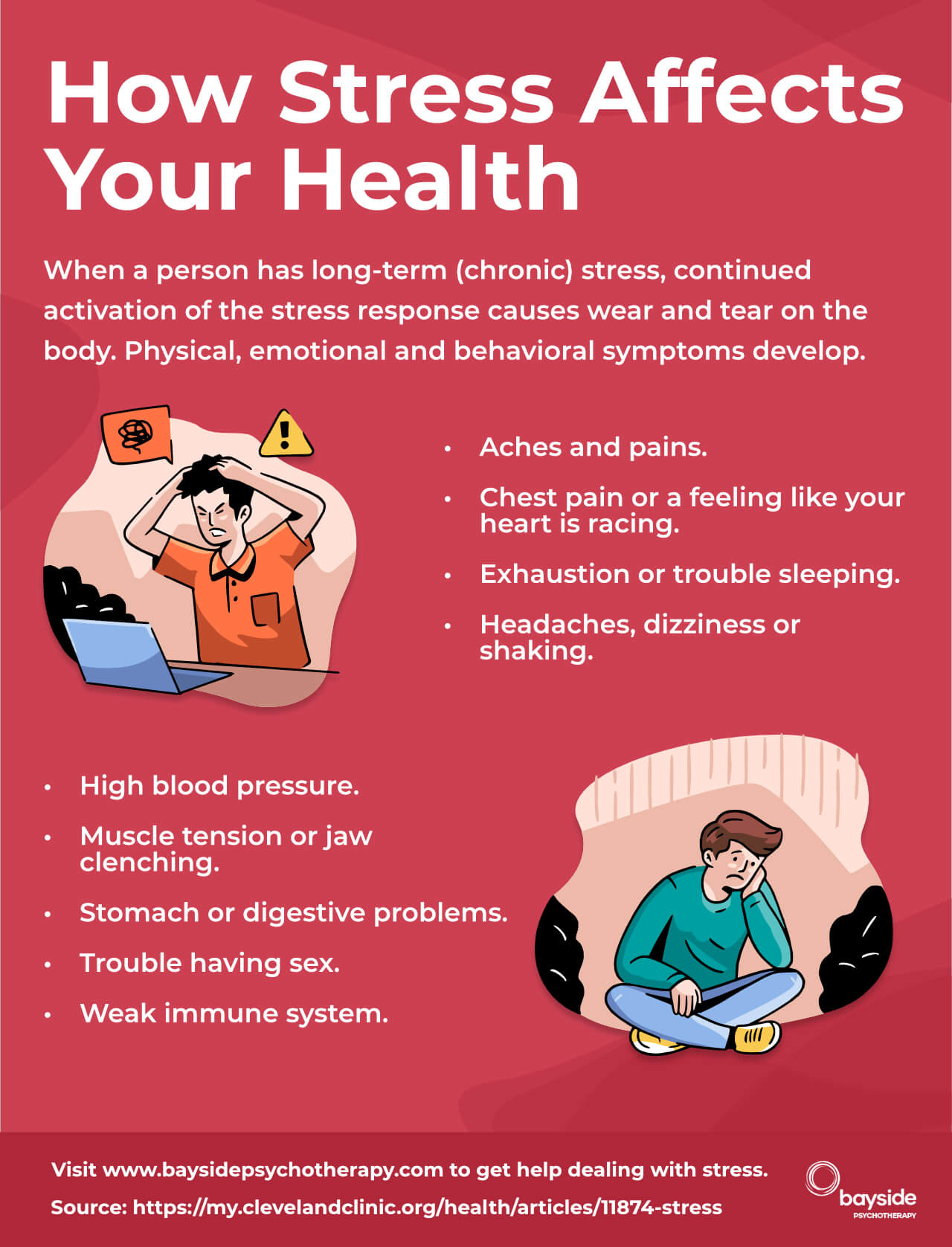
We all feel stress from time to time but stress has become a common yet often unpleasant component of western culture and was a commonly endorsed side effect of the COVID 19 pandemic in 2020. While some stress levels are normal and adaptive, overwhelming and persistent stress, even chronic stress can interfere with your physical and mental health, relationships and work and in many cases lead to serious illness.
These are some of the signs people under high stress may experience:
Physical: changes in appetite, changes in sleep and energy levels, headaches and muscle tension, gastrointestinal upset and rapid heart rate.
Psychological/Emotional: feeling overwhelmed, being moody or irritable, difficulty concentrating, anxiety and depression, worrying frequently.
The trained therapists at Bayside Psychotherapy will endeavour to help you reduce stress’s impact on your life. Our training and knowledge may help you better cope and reduce the feelings of stress and anxiety in your life.

What is stress management?
Stress management is a wide range of techniques, strategies, and tools used to identify, address and reduce stress, helping individuals to maintain optimal well-being and functionality. Stress is a natural response of the body to any kind of demand or threat, triggering the “fight or flight” response. In our modern and ever changing world, we are faced with many challenges (such as work pressures, relationship problems or financial issues) that can cause high levels of stress.

What causes stress?
Stress is a natural response to events in our lives, triggers can be of internal and external factors. Exact causes of stress vary from person to person, depending on personal experiences, perceptions and coping mechanisms. Some common causes include:
External Stressors:
Life Events such as moving to a new home or country, divorce, death of a loved one, or losing a job.
Work-Related events can cause a person to experience stress, deadlines, job dissatisfaction, or workplace conflicts are common stressors.
Social issues like personal relationships, peer pressure, or social dynamics are major stressors.
Environmental stress caused by excessive noise, overcrowding, or pollution.
Internal Stressors:
Health concerns like chronic illness, injury, or other medical conditions can contribute to anxiety and stress.
Mental health issues & conditions such as anxiety, depression, or PTSD can further amplify stress reactions.
Negative self-talk & pessimistic thinking patterns or overly critical self-judgement is a major contributor to stress.
Setting unrealistic expectations & overly high standards, expecting too much from oneself and others can increase a person’s stress levels.
Other Stressors:
Other daily events can be the cause of stress in your life, think traffic jams, waiting in queues or losing personal belongings. Major life events can cause ongoing stress to become part of life. Life can be stressful on its own and learning about coping strategies on how to prevent stress is one way to manage and improve your life. You can speak with a stress management health professional at Bayside Psychotherapy.
It’s important to note that the perception of what is stressful varies among individuals. A situation that’s stressful for one person might be exhilarating or inconsequential to another.

What Treatments Do You Have Available for Stress?
Treatment for stress can draw from many modalities including cognitive behaviour therapy (CBT)and mindfulness-based stress reduction therapy. CBT involves helping individuals potentially identify how their thought patterns may relate to the level of stress experienced and how to possibly manage their relationship to their thoughts more effectively.
Stress treatment may also be facilitated by DBT skills which may help manage heightened emotions and address lifestyle factors to prevent an individual from becoming overwhelmed. Developing a mindfulness practice has also been shown as an effective technique to manage stress and emotional wellbeing.
Let’s find out if we may be able to help you manage stress.
Our therapists work with you using relaxation techniques, stress and anxiety counselling, psychotherapy and mindfulness meditation.
Stress management techniques may include:
- Hypnotherapy. Downloadable recordings are available and may help you to relax.
- Counselling and mindfulness therapy may help you to identify the causes of destructive emotions. Very often, this type of counselling may help you feel less overwhelmed.
How does stress affect the body?
Stress activates the body’s “fight or flight” response, releasing hormones like adrenaline and cortisol (stress hormone). While this response to stress is essential for handling immediate threats, prolonged stress can lead to various physical, emotional, and behavioural effects.

Physical Effect
The Physical Effects of stress on the body can manifest in many ways such as increased heart rate, a weakened immune system, poor digestion, fluctuations in diet and can even have a detrimental effect on the reproductive system, in men stress can cause impotence and lower sperm count and for women periods can become more painful, heavier and irregular.
Seeking professional help to cope with stress is a great first step to getting back to a normal work and family life. Speak with one of our mental and physical health professionals online.
Emotional Effects
Stress can also cause sufferers to experience mood disorders like depression and anxiety, feelings of overwhelm, fear or cause constant worry. Learning ways to reduce stress is key to emotional issues.
Behavioural Effects
Stress and its effects can lead to trouble sleeping in the form of insomnia or excessive sleep. Too much or too little sleep has a serious impact on cognition. Another serious effect on behaviour is weight gain or loss, sufferers may comfort eat as one of the ways to cope or lose their appetite entirely.
Long-term or chronic stress, without adequate coping mechanisms, can lead to serious health complications, making stress management crucial for overall well-being.
Stress can dominate your life and result in diminished quality of life as well as serious health consequences.
Am I Stressed?
A state of mental or emotional strain caused by adverse circumstances best defines stress. The condition is associated with a long list of physical and mental symptoms. Some symptoms include acne, headaches, aches and pains, and the feeling of constantly feeling ill.
Stress may also take a toll on your immune system and can cause increased susceptibility to infections. Disruption of sleep, insomnia, changes in sex drives, and digestive problems are also other symptoms of high stress levels. If you’re experiencing two or more of these, you’re most likely dealing with stress.
Does Stress Affect My Health?
Stress symptoms may be affecting your health, even though you might not realise it. You may think illness is to blame for that irritating headache, your frequent insomnia or your decreased productivity at work. But stress may be the cause, and its symptoms can affect your body, your thoughts and feelings, and your behaviour. Being able to recognise common stress symptoms can help you manage them. Stress left unchecked can contribute to many health problems, such as high blood pressure, heart disease, obesity and diabetes.

How Long Will It Take Me to Manage My Stress?
There are many stress management techniques out there. Some people may adapt and change quickly with relaxation, meditation, and NLP therapy. Others may need more in-depth analysis and counselling so that they are better able to cope with the demands in their internal and external environment. Unresolved issues may be present and the willingness to participate in your treatment is a factor. The good news is that treatments are flexible and the approach is based on your needs and your goals. We can assess your treatment method on an ongoing basis and discontinue or space treatments out when required.
Our main objective is to help you more easily cope with the demands of your life. Your therapist isn’t going to be the one answering all the questions. They’ll be working with you so you can potentially deal with your stress more effectively, putting you in control. You can also download our Stress Management recording as it may complement your sessions.
Seek Treatment For Stress
Call Bayside Psychotherapy on (03) 9557 9113 to find out if we’re able to help you. Your call is completely confidential, and there’s absolutely no obligation.
You can also book an appointment by using our online booking form for online appointments. Or, if you prefer, you can book an in-clinic session.
Self-hypnosis may also work well when used in conjunction with counselling. You can download our Stress Management Self Hypnosis recording from our website.
Note: This information is informative only and is not to be used for diagnosis or substitution of appropriate assessment and/or treatment by a registered practitioner. Information on this page and our entire site should not be construed as implying that our therapists are specialists in treating any condition whatsoever. While some of our therapists may have experience working with people suffering from a specific condition, not all of our therapists do. We do not guarantee any particular level of performance, cure or management of symptoms. Each case is unique and responds differently with collaboration between client and therapist being crucial. Always seek an appropriate assessment from a qualified professional such as a GP, psychiatrist, clinical psychologist or social worker especially if you are acutely distressed.
Reception Phone Hours
- – Monday 8:30am to 5:30pm
- – Tuesday 8:30am to 5:30pm
- – Wednesday 8:30am to 5:30pm
- – Thursday 8:30am to 5:30pm
- – Friday 8:30am to 5:30pm
Closed on public holidays
Choose your own date and time for an online or in-clinic session
Therapist Hours
- – Monday 8:00am to 8:00pm
- – Tuesday 8:30am to 8:00pm
- – Wednesday 8:30am to 8:00pm
- – Thursday 8:30am to 8:00pm
- – Friday 8:30am to 8:00pm
- – Saturday 8:00am to 6:00pm
Closed on public holidays






